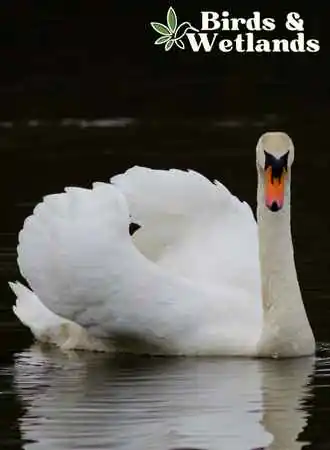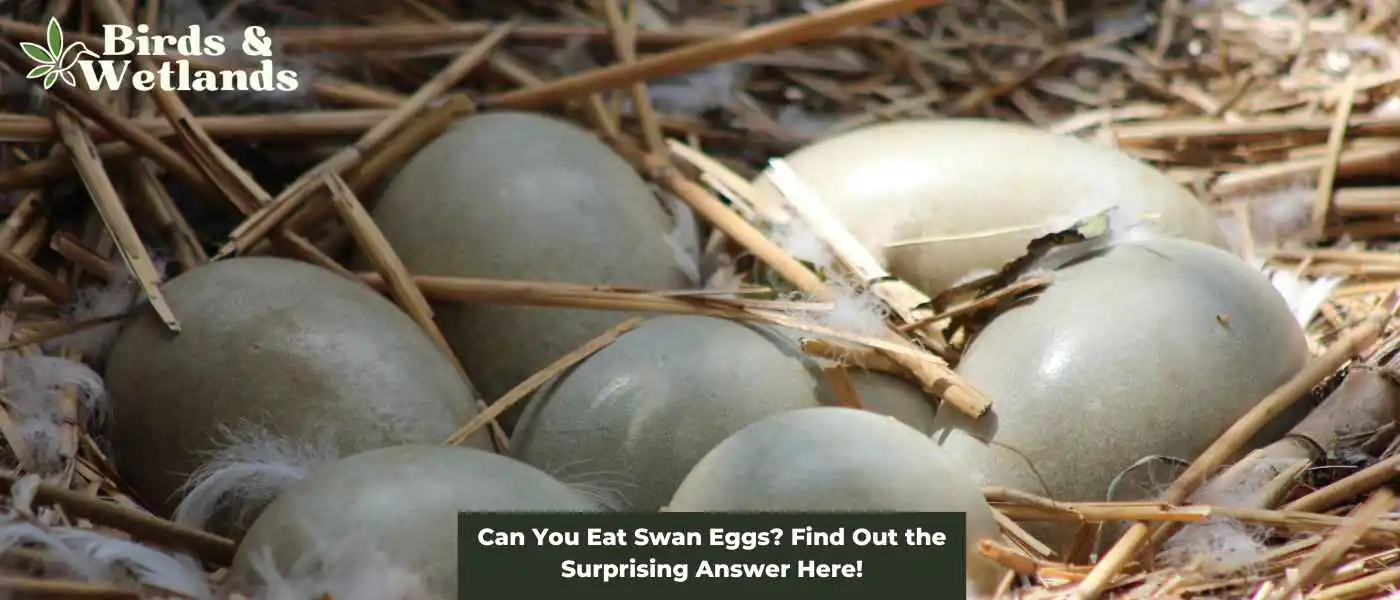It’s a question that may have you scratching your head. Can you really eat swan eggs?
While most of us would never consider eating a swan, the answer is a surprising yes! Swan eggs are edible and have been eaten for centuries, though their availability and legality in certain parts of the world can vary.
In this article, we’ll dive into the history and nutritional value of swan eggs and how to prepare and cook them. So, let’s get started and learn more about this unique food!
Key Takeaways on Eating Swans’ Eggs
- Swans are protected under the Migratory Bird Treaty Act of 1918, making it illegal to hunt or possess them without a permit.
- Swan eggs have a creamy flavor similar to quail or duck eggs and can be used in omelets or custards.
- In North America, Eating swan eggs is considered unethical and morally questionable due to their status as symbols of grace and beauty.
What are the different swans in North America?
Before we talk about eating swan eggs, let’s take a look at the different species of swans of North America.
The trumpeter swan is the largest waterfowl species native to North America. It is known for its distinctive vocalization, which sounds like a trumpet, hence its common name.
Trumpeter swans have white plumage and a black bill. These birds are typically found in wetlands and along rivers and lakes.
In the early 1900s, the trumpeter swans were nearly extinct due to the overhunting of their feathers and lead poisoning. Fortunately, breeding populations of trumpeter swans have bounced back thanks to various conservation efforts.
The tundra swan breeds in the Arctic regions of North America and migrates to more southern locations during the winter. These swans have a similar white plumage as the trumpeter swan but can be distinguished by their yellow lores (the area between the bill and the eye) and slightly smaller size.
Tundra swans are a common sight in many parts of North America during migration and are also known for their high-pitched vocalizations.
The mute swan is a non-native species introduced to North America from Europe. These swans have an all-white plumage and an orange bill with a black knob at the base.
Mute swans are widely known for their aggressive behavior and tendency to outcompete native species for food and nesting sites. As a result, they are considered an invasive species in many parts of North America, and efforts are being made to control their populations.
Moreover, mute swans are also known to cause damage to wetlands and other habitats.
A fourth non-native swan species exist in North America — the whooper swan. Whooper swans breeding in the taigas of northeastern Siberia often migrate to western Alaska, where winters are not as harsh as their breeding range.

Is eating swan eggs even legal?
The legality of eating swan eggs depends on the jurisdiction and the swan species. In North America, three of the four swans on the continent are protected under the Migratory Bird Treat Act (MBTA) of 1918. These swans include the trumpeter, tundra and whooper swans. While not protected under the MBTA, the mute swan has protections in some states.
The Migratory Bird Treaty Act (MBTA) of 1918 is a federal law that protects birds, including swans, which migrate between Canada and the United States. The MBTA was designed to protect migratory birds from being hunted and killed for their feathers or sport.
Under the MBTA, it is illegal to hunt, capture, possess, disturb, or sell any migratory bird, including swans, without a permit. The law applies to both native and non-native species and prohibits activities such as buying and selling feathers, eggs, and nests. The MBTA also protects migratory birds that are in danger of extinction.
As you can see, you can’t just take the eggs of swans because doing so will most likely land you in trouble. Additionally, there are several moral and ethical dilemmas in using swans and their eggs as food sources.
Eating swans and their eggs are generally considered to be an unethical and morally questionable practice in the context of North America. Swans are widely viewed by most people as symbols of grace and beauty, and many have strong emotional attachments to them. Many people go out of their way to visit a swan lake to watch these majestic birds glide and swim idly in the water.

What does a swan egg taste like?
Knowing what swan eggs taste like is sure to pique the curiosity of many adventurous eaters. While it’s true that the flavor of bird eggs can vary depending on their parent’s diet, swan eggs tend to have a particularly creamy flavor compared to typical chicken eggs, similar to quail or duck eggs.
If you get your hands on some but wish to avoid eating them raw, you could try making an omelet or some savory custards with them.
While eating swan eggs may not be for everyone, those who want to try them should go for them and see how it tastes.

Can you buy swan eggs from the grocery store?
You can’t buy swan eggs from any grocery stores in North America. Because unlike ducks and geese, swans are not bred for egg production. And there are various reasons for this.
Firstly, swans are wild birds whose natural habitats do not lend themselves well to captivity. Swans are migratory birds, so keeping them in captivity would require a specialized environment, making it difficult and expensive to sustain.
Swans also have specific dietary requirements, and they may not thrive in a farm environment. They are large birds and need a steady supply of fresh water and a large enclosure to move around. Providing these resources in a farm setting is not practical or feasible.
Swans are also very territorial and may become aggressive when confined in a small space. In some cases, swans have attacked humans, which would not be safe for farm workers.
Finally, swans lay eggs only once a year and usually only a handful at a time, making it difficult to sustain an egg production business. In addition, swan eggs are not considered to be particularly delicious and are not in high demand as a food item.
FAQs on Swans
Is it okay to eat swan meat in North America?
In the previous section, we discussed that most swans in North America are protected under the Migratory Bird Treaty Act. So swans are banned from table fare.
Hunting swans may be allowed in some states as population management, but there is a cultural reluctance to hunt swan. Hunters often opt to hunt other wild animals instead. Swan meat has a fishy taste which limits its application as an ingredient.
Eating of swans is widely considered taboo. Even those who eat meat regularly, don’t eat swans because they don’t see the swan as a food animal.
Can Canada geese and swans coexist in the same habitat?
Geese and wild swans belong to the family Anatidae, and their habitats often overlap with each other. The wild Canada goose and mute swan can be found in wetlands, marshes, and near bodies of water.
However, competition for resources such as food and nesting sites may occur. Additionally, swans are protective of their cygnets and have been known to be aggressive towards other animals, so there may be some conflict between the two species.

Was swan meat popular in the old times?
The use of swan meat as a main ingredient in various dishes dates back to medieval Europe. In fact, the roast swan was a popular delicacy among the wealthy and was served for Christmas dinner.
Swan meat was also used in a variety of pies and puddings. Swan use in dishes continued until the 17th century, when it gradually fell out of fashion.
In the 18th century, swan meat gained a resurgence in popularity and was served at banquets and other special occasions. Cooks would stuff, roast, and poach the birds and use them in sauces and other dishes. Some people filled the vent hole of the swan with melted butter or placed in a deep coffin with rye paste.
Swan was also included in some regional dishes, such as the Welsh traditional dish of faggots and peas.
In the 19th century, the swan was still used as a main ingredient in dishes, but it was falling out of favor. By the beginning of the 20th century, the swan was no longer a popular ingredient and had mostly ceased to be used in dishes.
Today, swans are still consumed in some parts of the world, but it is not a widely used ingredient in modern cuisine.
Does the royal family own all the mute swans in the UK?
The Queen owns all unmarked mute swans in open water, particularly along the River Thames in the UK, known as the “Swan Upping” tradition. This tradition dates back to the twelfth century when the Crown claimed ownership of all swans as a symbol of wealth and status.
The swan population is monitored and counted during the annual Swan Upping ceremony, carried out by the Queen’s Swan Marker and a team of swan uppers.

Do swans mate for life?
Yes, swans mate for life. As soon as a juvenile swan reaches sexual maturity, it will find a mate and stick together for the rest of their lives until one of them dies.
Are there black swans in North America?
Black swans are native to Australia and are an introduced species in North America. Small breeding populations are dispersed throughout southern Florida.



